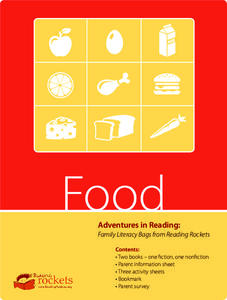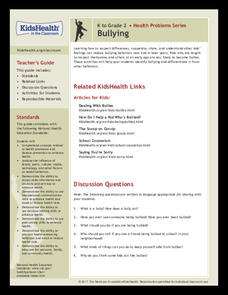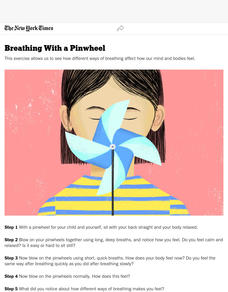Curated OER
The Human Body
Explore the human body through hands-on activities. Young learners will trace their bodies and place cut out body organs in the proper place, print patterns using cut fruit, sing songs about good nutrition, and use their five senses...
Nemours KidsHealth
Obesity: Grades K-2
Kids Health presents two lessons that encourage them to move their bodies and eat balanced meals. In making smart choices, learners list five exercise activities to replace screen time. Pupils discuss types of food and categorize them as...
Nemours KidsHealth
Alcohol: Grades K-2
Two lessons focus on alcohol's effects on the human body and encourage participants to make responsible choices. First, scholars identify five adults they can turn to for guidance and craft a construction paper hand that lists the...
PBS
Reading Adventure Pack: Sleep
A reading adventure pack features two stories—Time to Sleep by Denise Fleming and Animals Don’t Wear Pajamas by Eve Feldman. In response to reading the fiction and nonfiction texts, scholars create a dreamcatcher, discuss hibernation,...
Nemours KidsHealth
Fast Break!: Grades K-2
Before a test or quiz, warm up the brain and body with two minutes of exercise. Browse seven cards that showcase a different exercise. Each card provides a picture and a written description.
PBS
Reading Adventure Pack: Food
An activity packet about food begins with reading two texts: Stone Soup by Marcia Brown or John Muth and Where Does Food Come From? by Shelley Rotner and Gary Goss. Learners then take part in three activities. They design a puzzle...
Nemours KidsHealth
Colds and Flu: Grades K-2
Two lessons identify three steps to prevent catching a common cold or the flu. The first lesson turns a familiar song into a friendly reminder to wash hands, cover your coughs, sneezes, and keep hands off your face. Lesson two challenges...
Nemours KidsHealth
Safe and Healthy Summer: Grades K-2
Two lessons invite scholars to plan a fun and busy summer. Lesson one begins with a discussion in which pupils list favorite summer activities then draw a picture. Lesson two challenges learners to track their daily activity on a...
Nemours KidsHealth
Head Lice: Grades K-2
Head lice—how not to get or give it. Scholars read or listen to kid-friendly articles that offer information about head lice. They complete a worksheet that identifies items they should and should not share with their peers.
Nemours KidsHealth
Healthy Snacking: Grades K-2
Two lessons, all about snacking, look closely at how to make smart, balanced choices. Lesson one challenges pupils to create a menu for the hypothetical restaurant, The Snack Shack. Lesson two offers a variety of informative articles...
Nemours KidsHealth
School Lunch: Grades K-2
Two lessons encourage scholars to make smart eating choices. The first instructional activity sorts food items into the MyPlate's food groups. Learners scour magazines to cut and paste examples onto a paper plate that showcases each...
Nemours KidsHealth
Bike Safety: Grades K-2
Two lessons encourage young scholars to take safety precautions while riding a bicycle. First, learners practice hand signals used to tell others on the road where they are going. Second, pupils decorate a helmet to make a safe fashion...
Nemours KidsHealth
Food and Cooking Safety: Grades K-2
A cut and paste activity emphasizes the importance of safety precautions while cooking and baking. After reading several kid-friendly articles, class members cut 10 safety ingredients to paste on the pot's corresponding shape.
Nemours KidsHealth
Stress: Grades K-2
Two activities focus on stress—its triggers and tools to manage it. The first activity asks pupils to identify personal stress triggers then practice stress management techniques. The second activity gets scholars up and moving with yoga...
Nemours KidsHealth
Bullying: Grades K-2
Two activities for young scholars explore the concept of bullying. The first activity examines scenarios to point out bullying behavior. The second activity encourages positive peer relationships by identifying kind and respectful...
National Science Teaching Association
Why Do We All Have to Stay Home?
Learners, especially young ones, might be confused about why or frustrated that we have to stay at home. Help answer questions and calm emotions with a nine-page resource that details topics regarding the COVID-19 pandemic.
The New York Times
Breathing With a Pinwheel
A pinwheel encourages deep breathing to calm one's body and recenter their thoughts. Scholars breathe into a personal pinwheel with different types of breathing patterns then answer a question about how they feel.
Missouri Department of Elementary
My Feelings
Encourage self-awareness with a lesson plan that challenges scholars to identify feelings—happy, sad, mad, and scared. Using a feelings thermometer, similar to that of a bar graph, pupils discuss how they would feel in specific scenarios...
Missouri Department of Elementary
What are Comfortable (Good) and Uncomfortable (Bad) Feelings?
Two puppets open a discussion about comfrotable and uncomfortable touches. Scholars add to the discussion information they remember from a previous lesson, then delve deep into three problem-solving safety rules, and explore...
Missouri Department of Elementary
Healthy Touches and Private Touches
Scholars identify the difference between healthy touches and private touches. A discussion leads pupils to recognize several trusting adults. Peers role-play scenarios in which they use three rules to remain safe.
University of California
Breathing Boards
Instill the importance of mindfulness with six breathing exercises. Scholars trace shapes using their fingers, following arrows that tell them when to breathe in and when to breathe out. Exercises increase by counts of breath in and out.
Missouri Department of Elementary
What Are Safe and Unsafe Drugs/Medicines/Objects?
Encourage responsible decision-making while boosting sorting skills with a lesson plan that looks at safe and unsafe situations. Scholars use two bags, one happy the other sad, to sort scenario cards. After a thorough examination,...
Missouri Department of Elementary
What Is Comfortable and Uncomfortable Touch?
Two stuffed animals open a instructional activity that examines two types of touch. Scholars discuss the difference between comfortable and uncomfortable touch. They offer examples then brainstorm ways an individual can keep safe from...
Thoughtful Learning
Calming Down with Deep Pressure
Stressed out and tensed up! When stressed our bodies tense and our muscles clench. Teach youngsters how to calm down with simple deep pressure exercises. Press and release!

























